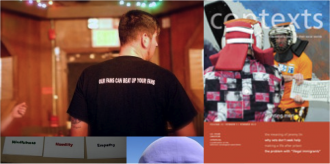 Home Again, Home Again
Home Again, Home Again
So, we are back from that extravaganza of society’s science, the annual American Sociology Association meetings. Among all the usual parties, plenaries, and pleasantries, the conference, held this year in New York City, featured lot of talk about blogs and social media, websites, and public sociology. For example, incoming ASA President Annette Lareau has created an ad hoc task force on social media, and apparently several different proposals are floating around to create an association-sponsored blog. Who knows whether or how these ideas will come to fruition before next year’s meeting. What is particularly intriguing and exciting for us is that The Society Pages seems to be very much on people’s minds and it’s been at the center of many of these conversations. Even as our HQ dispersed for the meetings and our authors circulated in NYC, our bloggers continued to blog and contributions and exciting ideas continued to come in. Among the highlights on the site this past week was a roundtable on one of the most fascinating cultural festivals in the nation, Burning Man, assembled by Matt Wray. Below, Letta Page has assembled some of the other weekend reading from the past couple of weeks of site work.
One last note: for those who joined us on Monday night, you know that W.W. Norton & Co. throws a fantastic annual party, and we’re honored to be invited. Thanks for coming, and thanks to Karl Bakeman and his team for putting together such a fun night. The Norton Party is always the home of some unforgettable moments.
Features:
“Burning Man: A Roundtable Discussion,” with Matt Wray. Wherein one sociological “burner” talks shop with fellow field (err, desert) scientists Katherine K. Chen, S. Megan Heller, and Jon Stern.
“The Homicide Divide,” by Lauren J. Krivo and Julie A. Phillips. The leading cause of death for young black men in the U.S. is homicide, a fact that holds enormous ramifications for an already disadvantaged population. I mean, you can’t get much worse than death (sociologically speaking or otherwise).
Office Hours:
“Natan Sznaider on Compassion,” with Shannon Golden. In one ASA session, organized by our fearless editor Doug Hartmann, we were reminded that passionate language has been stripped from so much academic sociology, leaving appeals to morality and compassion to social workers, rather than researchers. Let’s see what Sznaider can do.
Teaching TSP:
“FOOD, INC.: Film Guide,” by Kia Heise. Heise shares the first of many class guides she’s designed for students to use while watching documentaries in class and for the class to use as jumping-off points for discussion once the lights come up.
Citings & Sightings:
“Barroom Bystanders,” by Andrew Weibe. Penn State’s Michael Parks studies the conditions under which we’re willing to jump in with a “Cool, it, man, he just ganked your Bud Light. Bigger problems in the world… have you heard of sociology?”
Contexts:
A new issue of Contexts came out while you weren’t looking, and it’s chock full of great stuff! Highlights include this issue’s online feature, Scott Melzer’s “Ritual Violence in a Two-Car Garage” and a set of insightful Viewpoints articles arranged by Syed Ali around the topic of charter schools. Also be sure to check out Joshua Gamson’s conversation with his own parents about sociology as the family trade.
A Few from the Community Pages:
- Girl w/ Pen: So much goodness, from why stories matter for voting rights to a look at “Republic of Outsiders” and an introduction to the LadyDrawers collective.
- Sociological Images. Lisa Wade was much missed at this year’s ASA, but she and her colleagues kept on with the great work online (hopefully from some very exotic locale!). Exhibits A through forever: Kara Kamos’s video argument against the relevance of beauty, the endurance of “exotic” tropes, Phil Cohen on the insidiousness of Smurfette sexism, and Jay Livingston on the language of class in the U.S. and abroad.
- Cyborgology. While you weren’t looking, the entire U of California system went open-access (though I learned that the new hook is “public access” — get hip). Cultural capital in bookstores. The social power of Jay-Z’s new record.

Comments